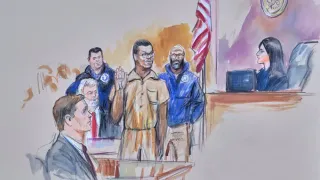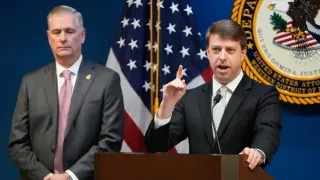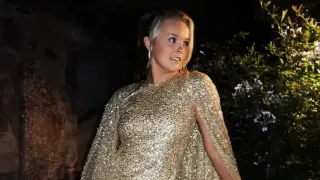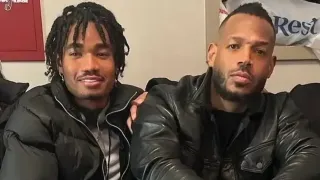January 5, 2015
Fascinating People :: Tom Elliot
Kilian Melloy READ TIME: 11 MIN.
So, dear readers, Season Two of your humble columnist's series of original short fiction -- which I like to think of as a sort of "Twilight Zone" with a queer spin -- has wrapped up. Season Three will commence as of June 1, but in between times I'd like to engage in a series of another sort: A string of interviews with Fascinating People.
Who, exactly, are Fascinating People? Anyone who is doing, or thinking, things that are a little different, and a lot interesting; anyone who has a bright idea, a way with creative energy, a style or a voice that stands out and sparks fresh new thought.
One such voice belongs to Tom Elliot, a podcaster working out of Liverpool, England. How distinctive is Tom Elliot's voice? Chris Clayton, fellow podcaster and co-host on one of Tom's productions, once reckoned on air that Tom's voice has the power to "melt underpants." (Calm down, now, fellas: Chris was talking about Tom's effect on women.) At any rate, Tom's voice carries qualities both of accessibility and authority; he offers scholarship imbued with personality. He is, in a way, a pop culture professor.
Tom's low-key, thoughtful commentary underscores the podcasts he does at his website, Gentleman's Grindhouse Records, which is the home of several programs. I first encountered Tom's work when, in the course of carrying out ongoing research into the kind of writing that characterizes anthology series like "Twilight Zone," I found my way to Tom's "Twilight Zone Podcast." In this show, Tom recaps the plot of each episode of the original Rod Serling anthology series, providing audio clips, behind-the-scenes tidbits, and insightful analysis. It is, as Tom sometimes puts it, "a bit of fun." But it's also a serious intellectual inquiry into one of television's landmark productions, a visionary series that helped put speculative fiction as a genre onto the map of sober, weightily thematic televisual literature.
Tom keeps busy with another regular podcast gig; he and the afore-mentioned Chis Clayton co-host "The Strange and Deadly Show," a podcast that, in each episode, examines a double bill of horror films (mainly American in origin) that were effectively banned in the U.K. in the 1980s... some, the two conclude, for good reason. Chris Clayton's is a very different voice from Tom's: Garrulous, staccato, peppered with cheerful vulgarisms, and utterly hilarious to listen to. His favorite target is Tom himself, but the ribbing is good-natured and obviously affectionate.
Tom Elliot very kindly took the time to chat with EDGE, and to talk all about the genres of the strange and fantastic, the art of the podcast, and what larks he and Chris Clayton get up to.
EDGE: Mr Tom Elliot! You call yourself a "humble podcaster," but I am an even more humble columnist, so may I say how honored I am to be chatting with you.
Tom Elliot: You're too kind!
EDGE: What drew me to your podcasts was a love of "Twilight Zone," a love you evidently share. So let's start there. In one "Twilight Zone Podcast," you related that the genesis of the show was you looked up one day and saw all the "Twilight Zone"-related books you had collected, and, being a podcaster, it occurred to you then that the show would be an ideal subject for a podcast -- especially since, at the time, there was no podcast that actually talked about the show. But where did that love of strange stories take root for you?
Tom Elliot: Two things come to mind. Horror films were never a restricted thing in my household as a child. There were obviously ones that were that bit too much that I wasn't allowed to watch, but things like John Carpenter's "Halloween" or "The Thing" I was watching from an early age, before I was ten, probably. It was a family thing, we'd all sit around and get scared silly together.
Some would find the idea of a child of that age watching those films to be wrong, but I don't see that as an unhealthy thing at all. We were together, having fun, and knew it was make believe, and I knew everything would be okay because my Mum and Dad were there.
The other thing is, unsurprisingly, "The Twilight Zone." They used to play in the early hours of the morning here in the UK, so I used to stay up and watch them and record them on VHS tapes to watch over and over when I was a kid. In those days it was all about the twist endings that blew my mind; it was only when I watched them again years later that the real messages behind the episodes became apparent to me.
So these two things are where my love of the strange and fantastic started. I like things that take me out of my own life. I couldn't think of anything worse than watching a soap opera or reality TV -- they just don't appeal to me at all.
EDGE: The "Twilight Zone Podcast" is thoroughly researched and produced at a level I don't think I have encountered anywhere else. You have stories about the trivia behind each episode you profile, and you include audio clips and theme music in each podcast. It's an awful lot of work, which is evident not only from the quality of the show but the fact that you had to leave the podcast for a while, turning the reins over to Luke Owen. Now you are back at the microphone -- how's it going? Are the hours needed to produce each episode still brutal? How many hours does it take to research, record, and edit each episode, anyway?
Tom Elliot: Back when I started the podcast I could research, write, record and edit a show in a matter of four or five hours, so managed to get it out on a weekly basis. As time went on and the show found its feet, I kept adding little touches here or there, or would get another book that I'd look for little bits and pieces in, and all of these things have added up to it being a bit of a monster. It must take about fifteen hours or so per episode to put together. That may not sound a lot, but when you're juggling a busy life in general, putting all of it together, it's tough.
Now I'm back, though. I'm glad to be back. I love the podcast, and I'm very proud of it. I didn't like having to leave it, but Luke did a great job covering. When it got to the point when he couldn't do it any more, I didn't like the idea of having to hand it over to yet another co-host, so I decided to do it again myself. I'm planning on doing an episode a month. That means it'll take a long time to complete, considering I've still so many episodes to cover, but if that's the way it is, that's the way it is. Luckily, I have a very supportive and understanding audience.
EDGE: Here and there, you've surprised and delighted your listeners with special episodes of the podcast in which you had guest hosts read short stories that episodes were based upon. (In the most recent episode, you yourself read aloud Charles Beaumont's story "The Howling Man," the basis for a Season Two episode of the same title.) Those episodes mix it up a bit; do they also offer you a little relief from the work load, or are they also a lot of effort to produce?
Tom Elliot: You're right, they do mix it up a bit, which is why I like doing them to break up the regular episodes and to show where those episodes came from. They are a relief in a way, too. You can just read the story without having to do research.
The time they take to produce depends on the story, really. I've done some where I simply read the story and that's it, but a story like "The Howling Man" is such an atmospheric tale that I wanted to add a bit more to it, which is why I took the time to add some effects to it and try to bring that atmosphere as much as I could. I'm very proud of "The Howling Man"; doing readings to release as audio books is a skill I'd really like to develop, and this is the first time that I feel I've really nailed it.
EDGE: I loved your voice characterizations for the characters in the reading of "The Howling Man," as well as the sound effects you employed. Did you engineer all the special sound effects yourself? And did you enjoy the experience enough to do further readings of short stories behind Twilight Zone episodes you have yet to profile?
Tom Elliot: Thank you! I used free audio effects from the web, but changed them. For example, I was having trouble finding decent male voice screaming effects, but there were plenty of female ones, so I just used those but changed the pitch and tweaked them here and there, which worked better in a way. I didn't want the sound of a man screaming, it had to sound a bit distorted, a bit wrong -- it was the devil screaming, after all!
I love doing the stories, and there will definitely be more. Strangely, they are the least-downloaded episodes, which is a shame, but I won't let that stop me doing them because the feedback from people has been great.
EDGE: Another way you've kept the podcast fresh and lively is to interview people with some connection to the show -- Rod Serling's daughter Anne Serling, for instance, and Paul Chitlik, who wrote for the first remake of the show, in the 1980s. You also interviewed filmmakers Jason and Sunny Brock, who are making a documentary about "Twilight Zone" writer Charles Beaumont, and you even talked with "Twilight Zone Companion" author Marc Zicree. How did those interviews come about? Also, do you have plans in the works for interviews with other individuals who have a connection in some way to "Twilight Zone?"
Tom Elliot: When I started writing online about six or seven years ago I was focused on the horror genre and would review horror DVDs. The PR companies would sometimes offer interviews with the stars of the films to publicise the releases. I did a podcast interview with an actor called Joe Pilato who starred in a zombie movie called "Day of the Dead" back in the eighties. It was a great interview, purely because Joe was so great, of course! But that interview got me noticed, and before long I was writing for a horror magazine in the UK called SCREAM, which I still do. I've been lucky enough to interview many horror actors, writers and directors over the years.
It's always easier getting interviews when you can go to your intended interviewee and say, "Look what I've done, these are the people I've spoken to, can I speak to you now?" There are a lot of people vying for their time, so it kind of makes you stand out more having some good interviews in your pocket. So, some of the "Zone" interviews came from me just approaching people, and they could see that I was legit from the examples I showed them. Others were from people coming to me because, again, I guess they could see I was legit. As for doing more, I'd love to. I'm going to try and get a few regular episodes under my belt first, then maybe I'll look at that again.
EDGE: The podcast is now addressing episodes from the original show's second season. Are there "Twilight Zone" episodes you are especially keen to get to?
Tom Elliot: You know, it's funny, but not any specific episodes, because in a way, for me, the ones that I find most interesting to talk about are the ones that are considered the "lesser" episodes, or the ones that haven't really broken into pop culture the way some of the "bigger" ones have. I find with those really well-known episodes there has been so much discussion of them over the years that I feel I'm just repeating what has been said by others already, although I do my best to put my own spin on things. The lesser known ones feel more like a journey of discovery, and I like that.
EDGE: Let's talk for just a minute about "The Strange and Deadly Show," in which you and Chris Clayton discuss horror films that were effectively banned in Britain in the 1980s. Hearing you with Chris is like seeing a whole different side of you! Chris loves to tease you about all sorts of things, and his humor is pretty earthy. His style is utterly different from yours -- do you feel he draws you out some, or gives you some inspiration?
Tom Elliot: Chris is one of the most talented podcasters I've ever known. I honestly feel someone should put him on the radio, give him a couple of hours a week, and say, "Do what you want," because he's just so naturally good! You're right, our styles are completely different, and we did wonder whether it would work out, but it seems to work great! I tend to veer naturally to a more serious tone, whereas Chris is a very funny guy. I'm not sure he draws me out as such, as I can't do what he does, so I don't even try; but I suppose when you put "The Strange and Deadly Show" next to "The Twilight Zone Podcast," tonally they are very, very different, and "Strange and Deadly" is much lighter. Chris does his thing, and I do my best not to crack up when he does it!
EDGE: Podcasting is sort of a new broadcast form, having emerged in just the past few years as an outgrowth of the Internet. Would you say this is a completely new form of broadcasting, or do you see yourself as taking up the mantle of old-time radio?
Tom Elliot: I suppose at its most basic it's "on demand radio" -- you listen to what you want when you want, but I think there's more to it than that. I find it fascinating and wonderful that a few guys or girls can set up a microphone in a spare room, or connect together over Skype and record a show for people to download that competes with the celebrities who are doing it; and it really is happening that way. If you look at iTunes, the top 200 podcasts are probably weighted a bit towards the celebrity or corporate podcasts, but the ones who are made by regular people like me are very well represented, too.
So, in its way, it is completely new, especially in how focused the topics are. Old radio was mainly music, news, sports, and, on some channels, drama. Obviously, talk radio has existed for a long time, but there wouldn't be programming where you could listen to people discuss every episode of "The Twilight Zone," or banned '80s horror films, or one of the hundreds of other topics that podcasters latch on to. That's what's so great about it; anyone can try it. There are no guarantees of success, but I'm under no illusions that I'm going to get rich off it, so as long as you enjoy it, that's the main thing.
Of the podcasts I listen to, only one is by a professional. The rest are by people in regular jobs with regular lives who take time out to create something for other people to enjoy, and I love that about it.
I will say, though, I think there is a certain romance about radio for me still. I love midnight radio of the kind you see in the movies, with the host with the low voice talking intimately with their listeners. There are various reasons why people are awake at night in the small hours when most are asleep. Some are working the night shift, others can't sleep, others might just like the quiet, but when the volume of the rest of the world is turned down and you're alone at night, I think the smooth talking radio host is good company. That midnight radio vibe is something I've tried to touch on with "The Twilight Zone Podcast," but I am toying with the idea of adding an internet radio station to my website GentlemensGrindhouseRecords.com, and becoming that midnight radio host that I've always wanted to be. Even if I only got a handful of listeners, I wouldn't care!
EDGE: I promised to keep this short, and look how I have rabbited on! I'll let you go now, but let me just say I do enjoy your podcasts and appreciate how much work you put into your shows. It's impressive, especially when one remembers you don't get anything but the satisfaction of doing it -- no money, no swag, no nothing. But you do have the gratitude of your fans, and I'm one among them -- so, thank you, Tom!
Tom Elliot: Thank you Kilian, it's been a pleasure and I'm honoured to appear on EDGE Media Network!






